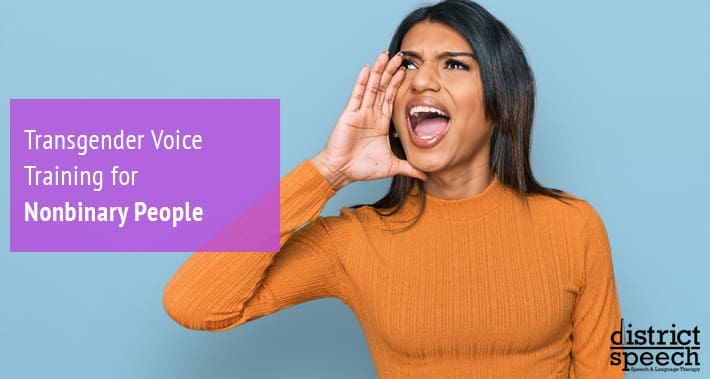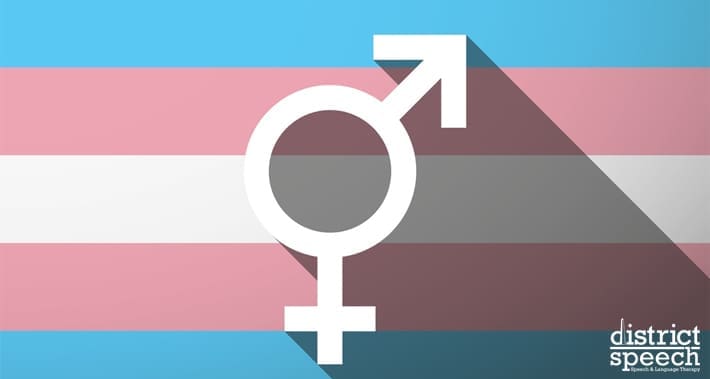
So, you’ve come out as nonbinary.
Now what?
First of all, welcome to the party!
For all its ups and downs, being transgender – regardless of your particular flavour – can be a beautiful experience.
As opposed to binary trans people – that is, trans women and trans men – nonbinary people can be vastly different from each other.
As a result, you might be interested in transgender voice training for nonbinary people, or you might not.
If you’re here, however, it’s a good bet that you’re interested in at least finding out more about how voice training for nonbinary people works.
So, you may as well keep reading.
Who Are Nonbinary People?
You may think that nonbinary identities are a modern invention.
However, nonbinary people have been recognized across societies and cultures for hundreds of years.
They might not have been called nonbinary, necessarily, but third gender identities are nothing new.
In fact, our very own trans feminine voice coach Sophie Edwards has a YouTube channel, We Have Always Existed, documenting some of the many different examples of transgender people living in the ancient Mediterranean and Near East.
Beyond that, however, there are the burrnesha of Albania, the akava’ine of the Cook Islands, the mahu of Hawaiian and Tahitian cultures, the fa’afine of Samoan culture, and many, many more.
Each of these represents a group of people who don’t fit into the gender binary, some of which are still around today.
But what about nonbinary people in the modern west?
Traditional understandings of gender focus on the supposed gender binary.
The gender binary believes in the existence of only two distinct genders: male, or “man”, and female, or “woman”.
Simply speaking, nonbinary people are individuals who don’t neatly fit into either of those two categories.
Nonbinary can be a gender identity itself, but it can also be an umbrella term used to refer to a wide variety of different gender identities other than “man” or “woman”.
Some, like demiboy and demigirl, are somewhere between man and woman, while others, like agender, exist entirely outside the gender binary.
Other gender identities you may see falling under the nonbinary category include:
- Genderfluid
- Bigender
- Neutrois
- Polygender
- Trans feminine
- Trans masculine
The Flavors Of Nonbinary
Some people who identify as nonbinary blend traditional male and female characteristics.
Some present as a gender that’s different from either male or female.
Others don’t identify with any gender at all.
Nonbinary people can be assigned any gender at birth as well.
Additionally, like all gender identities, nonbinary identities can change over time.
As you can see, not every nonbinary person will present the same.
Therefore, it’s best to ask nonbinary people directly about their identities in order to find out who they are.
Do Nonbinary People Need Voice Training?
Not necessarily.
Some nonbinary people may experience gender dysphoria when it comes to their voice.
If that’s the case with you, voice training for nonbinary people may benefit you.
However, if you’re happy with your voice, there’s no reason to need to change it.
Because the idea of being nonbinary often (but not necessarily) involves blurring the lines between genders, you may feel like your pre transition voice suits you just fine.
Or, you might not feel the need to transition at all, continuing with a presentation that more or less fits your assigned gender at birth.
For some, gender is a performance, and for others it can be a more personal matter – and here at District Speech and Language Therapy, we aren’t in the business of making people feel worse about themselves.
Much like with accent modification and reduction speech therapy, it’s only a problem if you think it’s a problem.
If you feel the need to seek out nonbinary voice training, we’re here to help – but if you’re happy with your voice the way it is, that’s great too.
How Does Voice Training For Nonbinary People Work
We’ve already discussed the many variations of nonbinary identities.
Therefore, it shouldn’t be surprising to learn that voice training for nonbinary people can also vary depending on your specific strengths and goals.
Let’s take a closer look at some of the various methods used invoice training for nonbinary people.

1. For Nonbinary People Who Want A More Masculine Voice
This type of voice training is typically used with peopleassigned female at birth.
Your speech therapist will focus on strategies aimed at lowering your voice’s pitch.
For instance, learning to speak with your diaphragm can help to lower the pitch of your voice.
Speaking with your diaphragm involves training yourself to produce sound from your chest rather than your head or throat.
Posture can also help to masculinize your voice.
Standing with your chest out and chin up can help to deepen your voice and make it easier to project.
If you’re opting for testosterone as hormone replacement therapy, in most cases it will naturally deepen your voice as well.
This is because testosterone thickens and lengthens your vocal cords – at the top of your larynx – which vibrate in order to create sound.
However, a number of trans masculine people still seek out speech therapy to get the most out of their voice, since like all puberties, your results may vary.
2. For Nonbinary People Who Want A More Feminine Voice
This type of voice training is typically used with people assigned male at birth.
If you’ve been through testosterone driven puberty and are looking to find a more feminine voice, your first instinct might be to assume you need to speak in a higher pitch.
However, forcing yourself to speak in higher pitch can not only lead to vocal fold damage, it’s unlikely to achieve the results you’re hoping for.
Since testosterone driven puberty naturally deepens the voice, voice training for nonbinary people looking to feminize their voice works differently than voice therapy for masculinizing your voice.
After all, estrogen driven puberty doesn’t reverse testosterone’s effects on the voice.
As a result, your transgender voice coach will focus on your intonation and resonance.
Intonation refers to the musicality of your voice and the way your voice hits different notes as you speak.
Traditionally masculine voices are typically flatter and more monotone than traditionally feminine voices.
Therefore, your voice coach will help you establish a broader scope of intonation.
On the other hand, resonance refers to where in your body your voice reverberates.
Traditionally masculine voices resonate in the chest, which is what gives them the broader, heavier, darker sound.
So raising your resonance out of your chest can help you to establish a more feminine voice – your voice coach can help you with that.
3. For Nonbinary People Who Want A More Androgynous Voice
Voice training can also help nonbinary people wanting to develop a voice that is neither traditionally masculine nor feminine.
In this case, your speech therapist will work with you to train your voice to speak in the androgynous range.
Traditionally masculine voices speak with little pitch variation and resonance felt in the chest.
On the other hand, traditionally feminine voices speak with a lot of pitch variations and resonance felt in the face.
Therefore, voice training aimed at producing a more androgynous voice focuses on adding or minimizing pitch variations as well as training your voice to produce resonance in your mouth and lip area.
Book Your Appointment With District Speech Today
At District Speech, we want you to feel comfortable with your voice.
Our professional speech therapists have a special interest in helping transgender and nonbinary people transition their voices.
If you want to find out more about our services and how we can help, don’t hesitate to reach out.
Book your appointment with District Speech today to get started.
1300 I St NW, Suite 400 E,
Washington, DC 20005
- https://g.page/districtspeech
District Speech and Language Therapy specializes in speech therapy, physical therapy, and occupational therapy solutions, for both children and adults, in the Washington D.C and the Arlington Virginia areas.